The trio of candidates were approved by leaders on Thursday, although no candidate secured unanimous backing according to multiple diplomatic sources.
EU leaders have concluded talks on who should occupy key power roles in Brussels over the next five years.
The nomination of Germany's Ursula von der Leyen for the EU executive, Portugal's António Costa as president of the European Council and Kaja Kallas as foreign affairs chief were confirmed by diplomatic sources shortly before midnight on Thursday.
But two sources told Euronews that Hungary's Viktor Orbán opposed the nomination of Ursula von der Leyen and abstained on Kaja Kallas. Meloni voted against both Costa and Kallas, and abstained on the nomination of von der Leyen.
Six negotiators representing the three mainstream political forces - Poland's Donald Tusk, Greece's Kyriakos Mitsotakis, Germany's Olaf Scholz, Spain's Pedro Sánchez, France's Emmanuel Macron and the Netherlands' Mark Rutte - had pre-baked a deal on the candidates earlier this week.
It sparked the ire of Italian premier Giorgia Meloni, who lashed out at the "undemocratic" process on the eve of the summit. Diplomatic sources say Meloni could seek concessions from EU leaders in exchange for her support, such as a privileged portfolio for the next Italian EU Commissioner.
The appointment to the top jobs does not require the unanimous backing of member states, but Italy's backing was considered necessary to give a show of political unity.
Earlier on Thursday, the bloc struck a security agreement with Ukraine and held discussions on military support for Ukraine, the vision for the next five-year mandate, the Middle East, migration, and the EU's defence and security.

 ${title}
${title}
Live ended
It's a wrap - Habemus top jobs!
It’s over, then – this time for real. The EU summit has ended – surprisingly earlier than expected.
All you need to know is that EU leaders agreed on the bloc's political leadership for the next five years: Ursula von der Leyen as president of the European Commission, António Costa as president of the European Council, and Kaja Kallas as the High Representative for Foreign Affairs and Security Policy.
Follow Euronews for follow-up stories and analysis of what happened today, as well as what will happen next.
Thanks for staying with us and have a good night!
Meloni licks her wounds - but doesn't fear isolation
The deal on the top jobs is a "big mistake" and "lack of respect" toward EU citizens, Italy's premier Giorgia Meloni told reporters after the EU summit.
Once again, she contested the negotiators' imposition of the deal brokered earlier this week which features a majority-opposition logic within the European Council “that makes no sense as it will be developed in the Parliament at a later stage.”
Although she didn’t back the top jobs package, she doesn't fear Italy will feel isolation at the EU level, though: “I exclude that if you disagree on something, they’re going to make you pay for that, it would be shameful." For this, she still expects Italy to helm a Commission’s portfolio "for a big country and EU founding father."
What the leaders agreed to, in full
In case our live blogging was not enough to satiate your curiosity or you need some light reading to send you off to sleep after this summit's excitement, here are the 22-page conclusions of the meeting. Enjoy!
‼️#EUCO adopted conclusions on Ukraine, the Middle East, security and defence, competitiveness, other items, the next institutional cycle and a roadmap for future work on internal reforms 👇https://t.co/HexOWjX5tP
— Ecaterina Casinge (@ecasinge) June 27, 2024
Europe needs 'stability' and 'possibility to act' - De Croo
Speaking to a group of reporters and responding to a question on whether the hard-right group of Meloni should get a more integral role on the EU stage, Alexander De Croo said: "What is important today is that Europe has stability and has the possibility to act."
"That's what politics is about," De Croo said. His European political family, the liberal Renew Europe, suffered bruising losses in June's European election and has fallen into fourth place in the European Parliament behind Meloni's faction.
Von der Leyen will reach out to MEPs outside the centrist coalition
To ensure she pieces together the majority needed to secure a second term at the helm of the EU executive, Ursula von der Leyen has said she will be reaching out to delegations and individual MEPs outside the centrist coalition made up of her own European People's Party (EPP), the Socialists and Democrats (S&D) and the liberal Renew Europe.
"I will also work intensively with the national delegations because experience shows that ... within the groups there are different voting patterns," von der Leyen said.
In 2019, she scraped through the parliamentary vote with a margin of just nine votes. She needs to ensure the backing of 361 lawmakers.
Macron says EU will 'increase the pressure' on Israel
The European Union will "continue to increase the pressure" on Israel so that it respects calls by the international community and the May 2024 ruling by the International Court of Justice to halt its offensive in Rafah, French President Emmanuel Macron told reporters.
"Like you, I find this slowness intolerable, this refusal to listen intolerable for all of us who see the scenes every day. Finally, we have always condemned the terrorist attack by Hamas, and of course we have always recognised Israel's right to defend itself. But since October, France has been calling for a ceasefire, and so we are not going to weaken in the pursuit of this work. And we are also in the process of preparing a more comprehensive plan with several states in the region and certain partners to try to provide a comprehensive political offer on this issue," he added.
Thierry Breton is 'my wish' for French Commissioner - Emmanuel Macron
French President Emmanuel Macron told reporters upon departing the summit that "France will propose a new Commissioner to the President of the Commission in due course."
But pressed to confirm whether his choice would be to reappoint Thierry Breton, as reported in Le Monde earlier in the day, Macron said: "That is my wish, I think he has the experience and the qualities to do so."
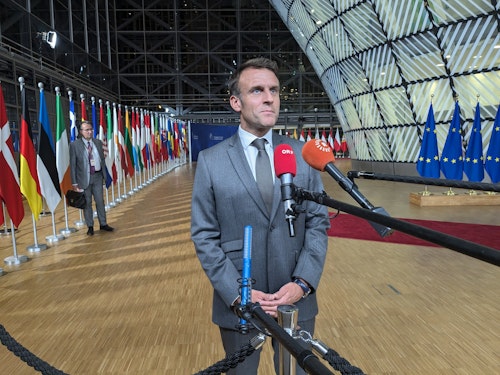
Von der Leyen expresses 'gratitude' for nomination
Ursula von der Leyen told reporters in Brussels that she was "delighted" by her nomination to secure a second term.
She will need to secure majority support in the newly-elected European Parliament before she can step into the role, with that vote expected in mid-July.
Proposal of centrist forces 'wrong in method and substance'
Giorgia Meloni, who earlier this week lashed out at a pre-baked top jobs deal negotiated between the three centrist political forces, has said that the proposal is "wrong in method and substance."
"I decided not to support it out of respect for the citizens and the indications that came from those citizens during the elections," the Italian premier added. "We continue to work to finally give Italy the weight it deserves in Europe."
La proposta formulata da popolari, socialisti e liberali per i nuovi vertici europei è sbagliata nel metodo e nel merito. Ho deciso di non sostenerla per rispetto dei cittadini e delle indicazioni che da quei cittadini sono arrivate con le elezioni. Continuiamo a lavorare per…
— Giorgia Meloni (@GiorgiaMeloni) June 27, 2024
Meloni abstained on von der Leyen to respect the positions of her governing coalition, sources say
A source tells Euronews that Giorgia Meloni abstained in the vote to propose Ursula von der Leyen as the next European Commission President in order to reflect the diverging positions within her governing coalition.
Meloni's Brothers of Italy (FdI) governs with the centre-right Forza Italia - which belongs to the same political family as von der Leyen's - as well as Matteo Salvini's Lega, known to be a staunch opponent of the Commission chief.
Vincenzo Genovese reports
Costa to focus on 'putting on track' the Strategic Agenda agreed on today
In a post on social media X, the newly elected European Council president António Costa announced he will take up this responsibility “with a strong sense of mission" and thanked EU leaders for their trust in him.
Costa will take office as of 1 December and promised his mandate will be one of continuity “focused on putting on track the Strategic Agenda, which the #EUCO has approved today and will provide guidance to the European Union for the next five years.” He also thanked his soon-to-be predecessor Charles Michel for his “immense commitment to Europe”.
It is with a strong sense of mission that I will take up the responsibility of being the next President of the European Council.
— António Costa (@antoniolscosta) June 27, 2024
I thank the members of the @EUCouncil for their trust in electing me, @PES_PSE and the @govpt for their support leading up to this decision.
As…
Kallas calls for stronger EU unity despite lack of consensus on her nomination
“I am honoured by the support of the European Council, this is an enormous responsibility at this moment of geopolitical tensions,” tweeted the EU’s High Representative-designate Kaja Kallas after her appointment.
She added that her main aim will be to achieve unity in the bloc and protect its interests and values in a changed geopolitical context. Her call for EU unity came after her appointment wasn’t backed by all EU leaders as Italy's Meloni voted against her while Hungary’s Viktor Orbán abstained.
“It will be my aim to now reach out to MEPs and achieve their support. As HRVP, I will be at the service of our common interests,” she said.
Honoured to be nominated as the candidate for High Representative of the EU for Foreign Affairs and Security Policy. Your trust means a lot.
— Kaja Kallas (@kajakallas) June 27, 2024
We must continue working together to ensure Europe is an effective global partner to keep our citizens free, safe and prosperous. pic.twitter.com/pbQEWjGjA2
'Satisfaction' for Tusk
The Polish prime minister confirms the election of Costa for the Council Presidency and the nomination of Ursula von der Leyen to head the EU executive, and Kaja Kallas for the top diplomatic role.
"Satisfaction. For Poland and for Europe," he said.
Kaja, Ursula and Antonio accepted. Defence plans accepted. Satisfaction. For Poland and for Europe.
— Donald Tusk (@donaldtusk) June 27, 2024
What did the 'problematic' leaders vote for?
Italy's prime minister Giorgia Meloni voted against Antonio Costa as European Council president and Kaja Kallas as EU's foreign affairs chief while she abstained on von der Leyen's re-appointment at the helm of the EU Executive, diplomatic sources told Euronews.
Hungary's premier Viktor Orbán voted against Ursula von der Leyen, in favour of Antonio Costa and abstained on Kaja Kallas, sources confirmed.
Portuguese President congratulates António Costa on his election
Portugal's President Marcelo Rebelo de Sousa has congratulated former premier António Costa for being picked as the next European Council President by EU leaders.
In a statement, the President - who hails from a different political family to Costa's - described it as a "magnificent decision for Europe and also for Portugal."
Presidente da República saúda decisões do Conselho Europeu e felicita António Costa
O Presidente da República saúda as decisões de hoje do Conselho Europeu que, na sequência das eleições europeias de 9 de junho, abrem caminho à continuidade do…
Now it's von der Leyen's turn
A diplomatic source tells Euronews that both Costa and Kallas have been approved for their respective roles and that leaders are now in the process of nominating Ursula von der Leyen to become European Commission President for a second five-year term.
António Costa elected as next President of the European Council, EU diplomat tells Euronews
A diplomatic source has told Euronews that leaders have approved the nomination of former Portuguese prime minister António Costa as the next President of the European Council.
Portuguese media are also confirming his election.
Isabel Marques da Silva reports
António Costa in line for EU top job, despite judicial woes
A sprawling corruption probe tumbled his government. Costa is now aiming for political vindication. #EuropeNews
Party negotiators kick off the debate on top jobs
The negotiators of the three centrist parties will begin the debate on the top jobs. These are:
- Poland's Donald Tusk and Greece's Kyriakos Mitsotakis for the European People's Party (EPP)
- Germany's Olaf Scholz for the Socialists (Spain's Pedro Sánchez is absent tonight)
- France's Emmanuel Macron and the Netherlands' Mark Rutte for the Liberals
After that, any leader who wishes to take the floor will be allowed to do so in a free manner, an EU official explained. European Council President Charles Michel, who chairs the talks, will "assess" the room and "take it from there."
"Hopefully it doesn't take long," the official added.
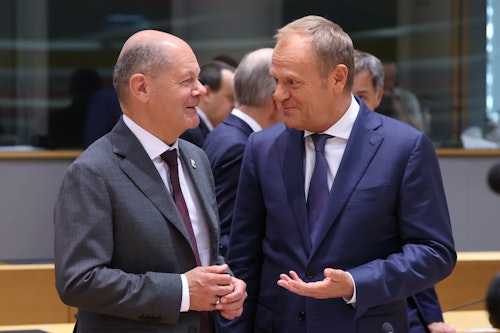
Three names pitched for EU top jobs meet 'political' and 'geographical' criteria - Fiala
Czech prime minister Petr Fiala has published a statement on X suggesting he backs the trio of candidates set to be approved by EU leaders for the top jobs in Brussels.
"It is crucial for the Czech Republic that the distribution (of top jobs) respects not only political but also geographical balance. The names that have been proposed so far meet these criteria. Furthermore, I know all of them personally, they have a positive relationship with the Czech Republic and I have very good experience working with them," Fiala said.
Fiala belongs to the European Conservatives and Reformists (ECR) party of Giorgia Meloni, and had previously chimed in with criticism of the way hard-right forces had been excluded from the political negotiations on the appointments.
The European Council is about to start a debate on the so-called top jobs in the EU.
— Petr Fiala (@P_Fiala) June 27, 2024
It is crucial for the Czech Republic that the distribution respects not only political but also geographical balance. The names that have been proposed so far meet these criteria. Furthermore, I…
Petteri Orpo will vote on behalf of Kallas
Finland's Petteri Orpo will vote on behalf of Kaja Kallas after she left the room to allow leaders to debate the top jobs. Kallas is the frontrunner to be appointed as High Representative of Foreign Affairs and Security Policy.
It's common practice in the Council that a leader votes on behalf of another when they're absent. Today, Chancellor Olaf Scholz will vote on behalf of Spain's Pedro Sánchez, who cancelled this participation following the passing of his father-in-law.
Interestingly, Orpo and Kallas hail from different political parties. Orpo belongs to the centre-right European People's Party (EPP) while Kallas is a liberal with Renew Europe. However, their political proximity to Russia has vastly aligned their political interests, as their trust in each other reflects.
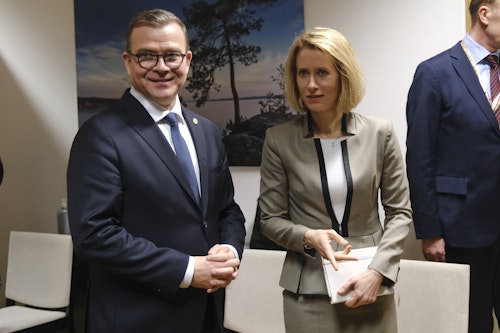
Von der Leyen and Kallas leave the room as leaders try to seal deal on top jobs
Ursula von der Leyen and Kaja Kallas, the frontrunners to be appointed president of the European Commission and High Representative, respectively, have left the room while leaders discuss the final deal on the top jobs.
A deal might be imminent. Stay tuned...
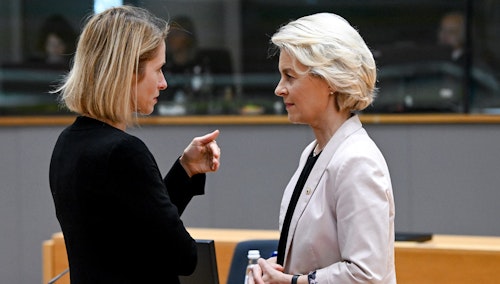
Leaders close Strategic Agenda and begin debate on top jobs
The summit has entered its final stretch.
Leaders have agreed on the Strategic Agenda, a document with broad outlines of political ambitions for the next five years. Germany and France submitted several changes to the wording, which had been painfully negotiated by diplomats in the weeks leading up to the summit. After consultations, the final text was agreed. A diplomat with knowledge of the discussions said the main tweak was an addition with a reference to NATO.
With the Strategic Agenda locked up, leaders can begin the debate on top jobs in full force.
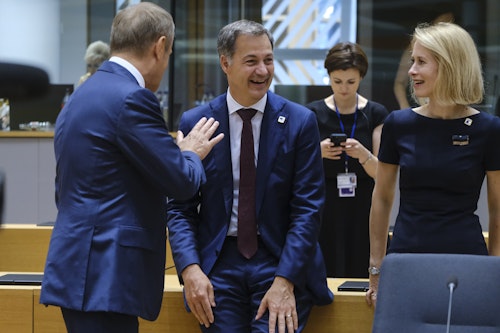
Summer vibes (with a touch of Italy) on the leaders' menu
Attempts to appease Giorgia Meloni might have started at dinner already, where leaders have been served as entrée some 'fiori di zucca' (courgette flowers) a traditional culinary delicacy from the premier's birthplace, Rome.
The main dish is a filet de sole à l’Ostendaise, a possible tribute to the Belgian presidency of the EU Council which is coming to an end.
To end the meal, leaders will enjoy what sounds like the most delicious course of the meal: nectarine and rosemary tarte tatin with a yoghurt mousse accompanied by coffee and herbal tea.
What happens next if the trio of candidates gets leaders' seal of approval?
If leaders throw their weight behind the tentative trio of von der Leyen, Kallas and Costa, two of the candidates still face further hurdles before they can step into the roles.
If approved, António Costa could become European Council President without any further scrutiny. This is expected to happen in December when the mandate of the current President, Charles Michel, comes to an end.
Kallas, however, would need to undergo a grilling by members of the European Parliament's foreign affairs committee, and survive an approval vote, expected in September. A majority of members of that committee would need to back her before she could become the EU's High Representative for Foreign Affairs and Security Policy.
Von der Leyen would need to secure the backing of an absolute majority of the entire newly-elected European Parliament before she could secure a second term as European Commission President. That vote is slated for mid-July. Does von der Leyen have the numbers? She made it by a razor-thin majority of nine votes in 2019, and analysts say the margin could be tight again this year.
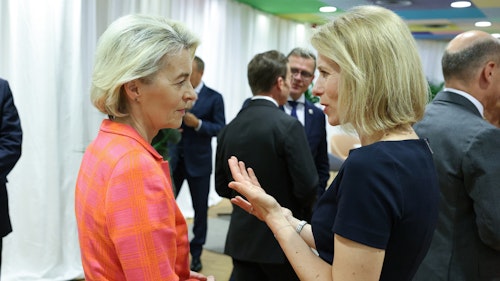
Meloni is the only thing standing between us all and sleeping at a decent time
“So far everything is peaceful,” commented an EU diplomat during the first break of the summit. “I have the feeling that everyone wants to go home.”
An unexpected early outcome of the leaders’ meeting will depend on the attempts to convince Italy to back the EU top jobs package, keeping in mind that there is no qualified blocking minority and that the worst-case scenario is abstention, the diplomat continued.
“We’re on the level to involve Italy, of course, they’re a strong country, a founding member of the EU,” added the diplomat, who comes from one of the countries that brokered the top jobs deal earlier this week.
“Still, we have a parliamentary majority for the top jobs,” they said. The key aspect is what could be offered to appease her rage. “I'm not sure she really wants a Commission’s vice president. There are other attractive portfolios,” the diplomat said, adding that this talks will be part of successive talks between Meloni and von der Leyen.
Czech prime minister makes pitch for the Strategic Agenda
As leaders discuss the EU's strategic priorities over the next five-year mandate, the Czech prime minister has pitched key focus areas: security, competitiveness, migration and cutting red tape.
All four areas are likely to feature prominently in the Strategic Agenda. Fiala's political family - European Conservatives and Reformists (ECR) - made slamming the EU's excessive bureaucracy a key message in their electoral campaign, claiming the bloc needs to cut red tape for businesses, farmers and citizens more generally.
Over the next five years, the European Union must focus on security and competitiveness. We need to tackle migration effectively, cut red tape and reduce the amount of regulations that affect citizens and businesses.
— Petr Fiala (@P_Fiala) June 27, 2024
Reminder: The top jobs are decided by qualified majority
Deciding on the top jobs doesn't require the unanimous consent of the 27 heads of state and governments.
According to the EU treaties, the top jobs are assigned by a reinforced qualified majority. For this, you need to meet two criteria at the same time:
- At least 72% of member states voting in favour, which means at least 20 member states.
- The member states voting in favour represent at least 65% of the bloc's population.
In other words, national vetoes do not apply. Given the dominance of centrist parties (EPP, Socialists, Liberals) in the European Council, the deal is all but guaranteed to sail through. As it stands, Giorgia Meloni and Viktor Orbán don't have the numbers to stop it.
Alternatively, they could abstain.
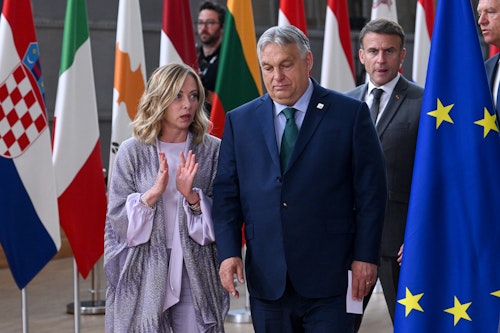
Leaders will call for 'credible pathways' to Palestinian statehood
Diplomats say that discussions on the Middle East are now over, in a sign leaders are rapidly proceeding through the agenda.
The conclusions will refer to "credible pathways to Palestinian statehood," one EU official said. Ireland and Spain moved recently to formally recognise the State of Palestine in a bid to revive the two-state solution, but other leaders are taking on a more conservative stance. A diplomat from a northern EU country said that they were hesitant to include a "premature" reference to the recognition of Palestine.
Leaders are expected to now move on to tackle the so-called Strategic Agenda - the bloc's roadmap for the upcoming five-year mandate - and try to clinch a long-awaited deal on the top jobs.
The feeling in the room: Everybody wants to wrap it up
As leaders are on a break, diplomats have been briefing journalists about the latest developments and one feeling is becoming increasingly widespread: leaders want to wrap up the summit tonight.
Although the meeting was initially scheduled for two days, Thursday and Friday, the quick pace of discussions is raising hopes that the whole agenda can be settled today. Dinner, expected around 20h00, will focus on the top jobs. If the deal on the three appointees is sealed over dinner, European Council Charles Michel will give a press conference and, in all likelihood, formally conclude the summit.
"We hope Giorgia Meloni will be constructive in the end," said a diplomat, when asked about the Italian premier's criticism against the top job deal.
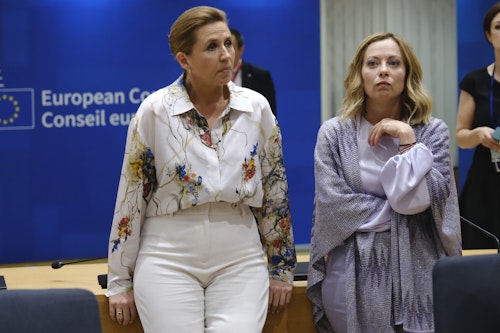
Leaders close conclusions on defence
The part of the conclusions dedicated to defence has been closed after France made proposals that were, surprisingly, in line with the demands of Germany and the Netherlands, a diplomat with knowledge of the discussion said.
Despite the majority of EU leaders wanting the EU executive and the foreign affairs chief to propose funding options to "fill critical capability gaps", the conclusions will only reflect the need to "address" them.
Both frugal countries wanted to include an explicit reference to private money to complement the public support needed to boost the EU's defence capabilities. The changes made to recognise private investment were deemed acceptable for Scholz and Rutte, and leaders moved to close the chapter, the diplomat said.
The divisive issue of "Eurobonds," collective debt to finance defence, was not explicitly raised.
Leaders are on a break to tweak Middle East text
The 27 leaders have taken a break: their deputies are now tweaking the paragraph of the conclusions dedicated to the Middle East.
Wording on the recognition of the State of Palestine was deemed "too ambitious" for some countries, a diplomat said. A reference to the ruling of the International Court of Justice (ICJ), ordering Israel to stop its military offensive in Rafah, is also under discussion.
Unlike previous summits, where the Israel-Hamas war was the source of deep disagreements, the topic is not expected to be particularly controversial, as leaders are keen to wrap up the deal on top jobs later tonight.
But a diplomatic source told Euronews that a group of countries was pushing for strong wording in relation to the ICJ order on Rafah.
In the latest draft conclusion seen by Euronews, a plea on Israel to halt its military operations in Rafah in line with the Hague court's order has been removed and replaced with an expression of “deep concern about the consequences on the civilian population of the ongoing ground operations in Rafah.”
What is the EU's security pact with Ukraine all about?
The European Union signed a security agreement with Ukraine today, aiming to continue providing the war-torn country with military, financial, diplomatic and humanitarian support over the coming years.
Under the EU-Ukraine pact, the bloc will "speed up and intensify the delivery of all necessary military assistance" - although the 12-page document does not mention any further commitments for following years, Alice Tidey reports.
The bloc will also keep training Ukrainian security and military forces, and strengthening cooperation to counter hybrid and cyber threats as well as foreign information manipulation and interference.
Ukraine’s Zelenskyy signs security pact with EU during Brussels visit
The Ukrainian leader’s visit to Brussels during a summit of EU leaders came days after the country held its first membership talks with the bloc. #EuropeNews
Can von der Leyen muster majority backing of European Parliament?
If Commission chief Ursula von der Leyen's reappointment by the EU Council proceeds as smoothly as expected, attention will turn to the European Parliament, where she must secure the necessary votes to seal a new mandate, Gerardo Fortuna reports.
Von der Leyen needs a majority of 361 votes in Strasbourg - one more than half the total of 720 MEPs in the chamber - but this support must come in a secret ballot – the biggest challenge to assessing support since it makes lawmakers less accountable, eroding party discipline.
“According to Berlaymont estimates, von der Leyen needs 40 to 50 additional votes because, at the moment, her teams count on a majority of 399 MEPs but they expect 15% of ‘mavericks’ [lawmakers voting differently from their parties],” an EU diplomat said.
Get all the details 👀
Can von der Leyen muster majority backing of European Parliament?
If Commission chief Ursula von der Leyen’s reappointment by the EU Council proceeds as smoothly as expected, attention will turn to the European Parliament, wh…
Announcement on new hard-right group could happen 'soon' - Viktor Orbán's political director
The Hungarian prime minister's political director has said that the announcement of a new right-wing grouping of "sovereignist" parties in the European Parliament is imminent.
Balasz Orbán (who is not related to the prime minister) said that Hungary's ruling Fidesz party - which secured 11 seats in June's European election - had hoped to establish a far-right group comprising of Meloni and Le Pen's parties, but is now looking at an alternative faction of like-minded political forces.
"The Hungarian goal is still that the right-wing political forces should be as united and as organised as possible," he explained.
Whilst he did not confirm the potential members, sources familiar with the talks have told Euronews they could include Slovak premier Robert Fico's Smer party, as well as former Czech prime minister Andrej Babiš' ANO party, which exited Renew Europe in a move that saw the liberals shed seven seats and lose its kingmaker status.
On Wednesday, a constitutive meeting of the hard-right European Conservatives and Reformists was abruptly cancelled amid a rift between its two biggest delegations - Giorgia Meloni's Brothers of Italy and former Polish premier Mateusz Morawiecki's Law and Justice (PiS). It has fueled speculation PiS - which won 20 seats - could choose to join forces with Orbán.
Summit agenda: Save the top jobs for last
Do you have coffee nearby? Maybe you should prepare yourself.
According to Charles Michel's spokesperson, the agenda item devoted to the top jobs will be discussed last on Thursday. The rundown is:
- Ukraine
- Middle East
- Security and Defence
- Next institutional cycle
This means Michel will ask leaders to discuss a series of sensitive geopolitical topics before they get into the equally sensitive matter of top jobs. As Bette Davis once famously said: "Fasten your seatbelts. It's going to be a bumpy night!"
‼️ The first day of the #EUCO has started with an exchange with President @ZelenskyyUa.
— Ecaterina Casinge (@ecasinge) June 27, 2024
On the agenda today:
📍Ukraine
📍Middle East
📍Security and defence
📍Next institutional cycle
➡️ More info on: https://t.co/LGnxZ53FWi pic.twitter.com/eVE62O04oP
The EU needs to ‘deliver’ to stop the rise of anti-European forces
"If we don't deliver, then those who would like to destroy Europe will only grow," European Parliament president Roberta Metsola told reporters during the summit in Brussels.
The parliament's president noted that the EU institution heard the message in these elections, that of people being worried about whether they can pay their bills, keep their jobs, or buy their own house.
For the next mandate, the Maltese highlighted the need for the EU to focus on implementing the legislative decision that it takes and addressing the economic and societal costs of its decisions.
“That is how we can bring Europe a little bit closer to how our people want it to be and how we will deliver on a stronger, fairer and better Europe for all Europeans,” Metsola said.

Germany, Poland and Czechia have asked the Commission for financial support to maintain Ukrainian refugees
German Chancellor Olaf Scholz said that he and his Polish and Czech counterparts have written to Commission President von der Leyen in a bid to secure EU funds to help countries that have welcomed the most Ukrainian refugees
"We have welcomed countless millions of refugees from Ukraine into our countries (...) but the question of who does what is not clearly distributed," Scholz explained.
"For example, Germany, Poland, the Czech Republic and a few other countries have taken in the most refugees. That's why I, together with my colleagues, think that now is the time to make decisions that, if other countries are less involved in taking in refugees, it means that Europe will help those countries (welcoming large numbers of refugees) to finance living expenses and vocational training, language courses and all the things that play a role," Scholz added.
Czechia, Germany and Poland - along with the Baltic states - have accepted the highest quota of Ukrainian refugees. An estimated 1.3 million Ukrainians have fled to Germany since the beginning of the Russian invasion of Ukraine.
Climate action back in EU’s policy priorities - leak
Nature restoration, water protection and boosting renewables are likely to remain among the political priorities of the EU's next institutional cycle, according to a leaked Strategic Agenda, seen by Euronews, a high-level EU guiding policy document set to be agreed during a summit of EU leaders starting today (27 June) in Brussels.
Previous leaks of the EU leaders’ guiding policy document suggested references to climate action had been all but erased, pointing to a U-turn to the European Green Deal’s main goals, but the latest draft document seen by Euronews pledges to “continue protecting nature” and to “reverse the degradation of ecosystems”.
Our EU policy reporter Marta Pacheco got the story for you 👇
Climate action back in EU’s policy priorities for the next term – leak
Idea of scrapping green priorities unveiled in a previous leak unleashed backlash from environmentalists and lawmakers but a new leak on the Strategic Agenda r…
Civil society organisations call on EU leaders to prioritise people and planet
120 civil society organisations have called on EU leaders to prioritise the needs of the people and the environment - and to reflect it on the strategic agenda for the next five years.
"We need real political solutions to the multiple crises we are facing," the organisations wrote in a letter sent on Tuesday (25 June) to the member state leaders, ministers, and parliamentarians.
The signatories believe that the EU agenda should include new rules to protect decision-making from corporate interference, as well as a fair industrial strategy and strong laws to protect people and the planet, to name but a few proposals.
"People at the impoverished end of the economy should not have to pay for the urgently required ecological transition," the letter reads.
🤜120+🤛 orgs say to EU leaders at #EUCO in Brussels: oppose the ‘Industrial Deal’ by #BigPolluters & lobby
— Corporate Europe Observatory (CEO) (@corporateeurope) June 26, 2024
✊We need real solutions to multiple crises - not industry agenda scrapping protections for profits!https://t.co/DNtLKLRUeM#EU2024BE pic.twitter.com/CwGb1Ucnrs
EU summit kicks off with financial requests
The EU summit has officially begun and some member states have already put forward financial demands.
"We are calling on the Commission to speed up the launch of financial support for the countries with the largest numbers of Ukrainian refugees," said Czech Prime Minister Petr Fiala.
The request is backed by Poland and Austria, he added.
Russia's war of aggression triggered a massive exodus of Ukrainians, prompting the EU to activate for the first time the Temporary Protection Directive to grant immediate residence and labour rights to those fleeing the conflict. According to the EU Council, there are currently over 4.2 million people from Ukraine who benefit from the mechanism.
The biggest population is in Germany, with 1.19 million refugees, followed by Poland (over 958,000) and Czechia (over 357,000). In the early days of the war, the bloc scrambled to mobilise €17 billion in assistance to support member states, using a combination of cohesion, recovery and home affairs funds.
Together with @Bundeskanzler and @donaldtusk, we are calling on the Commission to speed up the launch of financial support for the countries with the largest numbers of Ukrainian refugees.
— Petr Fiala (@P_Fiala) June 27, 2024
Top jobs package will be discussed 'carefully and fairly' - Scholz
With words that could appease Italian prime minister Giorgia Meloni, German Chancellor Olaf Scholz suggested that the top jobs package preliminarily agreed between the three mainstream forces would be put up for a fair discussion during today's leaders’ meeting.
“We have reached a political understanding between these three party families. That's just one position. We will discuss this carefully and fairly with each other,” Scholz explained.
“All 27 are equally important; that's important to me. But we have made decision-making easier. The European Council and the Member States must wisely make a proposal that can count on a majority in Parliament.”
Scholz also said Ursula von der Leyen should seal a second term as the Commission President by relying on the votes of the three mainstream parliamentary groups.
“Our intention is that the political platform that has supported Mrs von der Leyen in the past should continue to do so in the future, i.e. EPP, S&D and Renew Europe,” Scholz told reporters ahead of the summit.
But some delegations within these groups are likely to vote against von der Leyen in the secret ballot pencilled for mid-July. It means she could rely on lawmakers from Meloni's hard-right European Conservatives and Reformists (ECR) if she is to secure the job by a comfortable margin.
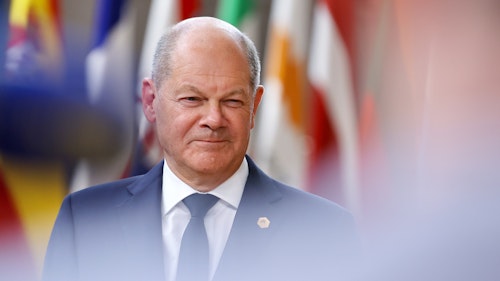
All smiles as EU leaders take group picture with President Zelenskyy
Volodymyr Zelenskyy is the special guest at today's summit and how better to celebrate than with a family picture?
The 27 leaders posed with the Ukrainian President to show their unwavering determination in the face of the Russian aggression. Also in the picture: Ursula von der Leyen, Charles Michel, Roberta Metsola and Josep Borrell, representing the main EU institutions.
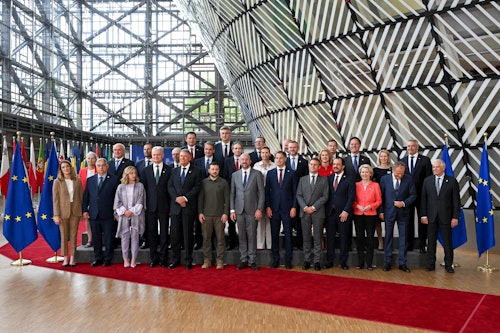
EU signs security agreement with Zelenskyy
The EU has just signed a long-term security agreement with Ukraine to provide the country with extensive support over the next years.
"These commitments will help Ukraine defend itself, resist destabilisation, and deter future acts of aggression," the president of the European Council Charles Michel just posted on his personal X account.
The agreement is not a mutual defence pact, but a joint plan to support Ukraine with military, financial, political, and human support in the coming years.
Ukraine has already signed similar agreements with countries such as Japan, UK and US.
"For the first time, this agreement will enshrine the commitment of all 27 Member States to provide Ukraine with extensive support, regardless of any internal institutional changes," Ukrainian president Zelenskyy said.
Today, with @ZelenskyyUa, the EU signs security commitments with Ukraine. These commitments will help Ukraine defend itself, resist destabilisation, and deter future acts of aggression.
— Charles Michel (@CharlesMichel) June 27, 2024
More concrete proof of the EU’s unshakeable resolve to support Ukraine for the long haul. pic.twitter.com/FgO5ovac3w
Deal on top jobs is 'shameful,' says Orbán
The deal on top jobs struck by the centrist parties is "shameful," says Viktor Orbán.
In a social media message posted shortly after his arrival at the summit, the Hungarian premier doubled down on his opposition to the agreement, which would see Ursula von der Leyen, António Costa and Kaja Kallas elevated to the top positions in the bloc.
"European voters have been deceived. The EPP formed a coalition of lies with the left and the liberals. We do not support this shameful agreement!" he wrote on his X account.
Due to his toxic, Russian-friendly views, Orbán has spent the last years without a political family. Not even the hard-right ECR group, where Giorgia Meloni sits, has been willing to accommodate his presence. This means that any negotiation among pro-European parties automatically leaves him outside.
Orbán is vehemently opposed to von der Leyen's re-election, as the Commission chief has partially frozen the country's recovery and cohesion funds due to its continued democratic backsliding. The Hungarian leader, however, hasn't voiced any objections to either Costa or Kallas. His displeasure therefore stems from the way the package has been put together, rather than the substance itself.
European voters have been deceived. The @EPP formed a coalition of lies with the left and the liberals. We do not support this shameful agreement! #EUCO pic.twitter.com/eOEjdi9mXZ
— Orbán Viktor (@PM_ViktorOrban) June 27, 2024
De Croo rebukes Meloni: 'That's how democracy works'
Alexander De Croo, the outgoing prime minister of Belgium, rebuked Giorgia Meloni for challenging how the top jobs are being distributed. The draft deal was sealed earlier this week by the EPP, the Socialists and the Liberals, the three main centrist parties, leaving Meloni's hard right excluded.
"What we need in the next five years is political stability and being able to act fast. Then you look around in the European Parliament and there are three groups that are willing to work together. That's how democracy works. You form a coalition of political groups that want to work together, that want to provide stability, that want to be action-oriented, and based on that, three very high-quality names have been put forward," De Croo, a liberal, told reporters.
"Democracy is not only about blocking, democracy is about who wants to work together, and those three groups are willing to work together to the benefits of all Europeans," he added.
De Croo insisted it is "important" to ensure the three EU institutions - Commission, Council and High Representative - "function together."
"If there's something we need to improve over the last five years is let's make sure that we have quality people who are willing to work together," he said, in an apparent reference to the rivalry between Ursula von der Leyen and Charles Michel.
De Croo said it was too soon for Meloni to ask for a high-level portfolio in the next Commission but he added he was ready to "listen around the table."
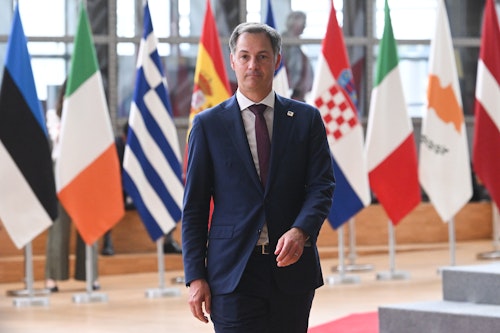
Rutte expects 'some debate' but believes deal on top jobs will go through
Mark Rutte, the outgoing prime minister of the Netherlands, believes the preliminary deal on top jobs will be approved by all 27 leaders.
"I expect some debate, but the three centrist political families came to an agreement. I think the deal will be like that, but we still have to see, of course," Rutte said upon arriving at the summit.
Rutte, together with France's Emmanuel Macron, represented the liberal family in the talks with the other two centrist parties, the EPP and the Socialists. Rutte took part in a joint call with all negotiators on Tuesday during which the draft deal on von der Leyen, Costa and Kallas was finalised.
After nearly 14 years as Dutch premier, this will be the last EU summit for Mark Rutte, who will soon become the next Secretary General of NATO. "I'm very proud," he said about his appointment, adding it "feels like a huge task" with "big shoes to fill."
Copyright: the Associated Press.
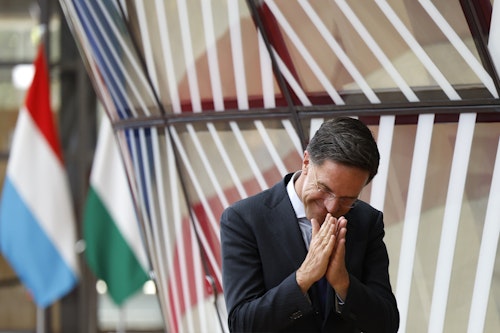
Parliament is ready to start working after EUCO decisions - Roberta Metsola
Speaking upon arriving at the summit, European Parliament President Roberta Metsola said the Parliament was ready to take the next steps as soon as the Council reached a decision on the top jobs.
Metsola said she looked forward to an agreement today and to starting work in the Parliament to deliver what citizens asked for in the European elections earlier this month.
Metsola said the priorities for the new mandate should include competitiveness, security and defence, and ensuring that no one is left behind in the digital and green transitions.
"Those were clear messages to us and those are the messages we are building around as we start to put together the new parliament," she added.
Metsola also welcomed the presence of Ukrainian President Volodymyr Zelenskyy and assured that the new Parliament will continue to work on enlargement.
The European Parliament will hold its first plenary session on 16-19 July, when the newly elected MEPs will elect the President. Roberta Metsola of the EPP is likely to take up her post for the next 2.5 years of the mandate, before a Socialist candidate takes up the baton for the remainder of the mandate.
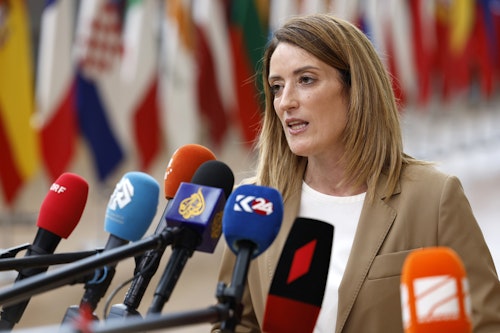
'Things are going well in Georgia,' says Orbán
Leave it to Viktor Orbán to break ranks with his EU peers.
When asked about the situation in Georgia, where the government recently passed a controversial 'foreign agents' law inspired by the Kremlin, the Hungarian premier painted a rosy outlook.
"Things are going well in Georgia, I mean, the path (to) European membership is OK, the Georgian government is doing well, the economy is improving, so I think you're on the right track," he said.
His words contrast with the EU consensus which says the new Georgia law severely imperils the country's accession process and, if not reversed, could lead to an all-out freeze. Orbán, like the sitting Georgian government, believes in maintaining close ties with Moscow, despite the invasion of Ukraine.
Asked if he would miss Mark Rutte, the long-serving Dutch prime minister who will soon become Secretary General of NATO, Orbán said that would be an "exaggeration." Rutte fought hard to secure Orbán's endorsement for the new post and promised him an opt-out clause in any future NATO activities in support of Ukraine. Orbán has repeatedly opposed any military provisions to the war-torn nation.
Copyright: Associated Press.
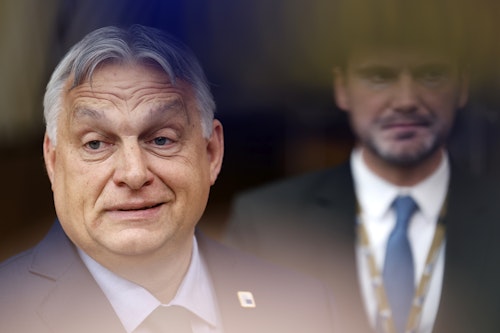
Europe must recover the ‘time lost’ on defence readiness, Borrell says
“Europeans have been underinvesting in defence, and now we have to recover the time that we have lost,” said the foreign affairs chief, Josep Borrell.
The High Representative pointed out that the bloc needs to think about how to give a big boost to its defence capabilities – and highlighted Europe’s dependencies on external suppliers.
Nearly 75% of the bloc’s military supplies come from out of the EU, Borrell said, adding: “This is not affordable. This cannot be for a geostrategic player to behave”.
Giorgia Meloni arrives and skips journalists
Giorgia Meloni, the centre of attention at today's summit, has entered the premises of the European Council without saying a word to the eager journalists waiting in the corridor.
'Inadequate' if conclusions do not reference Israel's compliance with ICJ order on Rafah - Simon Harris
Speaking ahead of the summit, Irish Taoiseach Simon Harris said EU leaders have a duty to urge Israel to respect the Hague-based International Court of Justice's ruling, issued on May 26. It orders Israel to immediately halt its offensive in the southern Gazan town of Rafah, where some 1.4 million Palestinians are estimated to be sheltering from war.
“I can’t find an adequate word to capture how it would be so inadequate to see conclusions not referencing compliance with the ICJ," Harris said.
“For me, that’s kind of basic,” he added, “We have an international court, and by god, we should recognise when it makes an order.”
In draft conclusions seen by Euronews, a plea on Israel to halt its military operations in Rafah in line with the Hague court's order has been removed and replaced with an expression of “deep concern about the consequences on the civilian population of the ongoing ground operations in Rafah.”
A diplomat from one EU country said prior to the summit that agreeing on a common statement on the conflict in Gaza is “always a difficult issue” and that the drafting will likely continue “until the very end.”
The Commission and the EU’s top diplomat have jointly called on Israel to respect the ICJ order, but the EU’s 27 countries are yet to find the necessary majority to issue such a statement.
Deep divisions have emerged between EU leaders since the war between Israel and Hamas first broke out in October. Back in February, Hungary wielded its veto power to block a joint EU appeal for Israel not to strike Rafah.
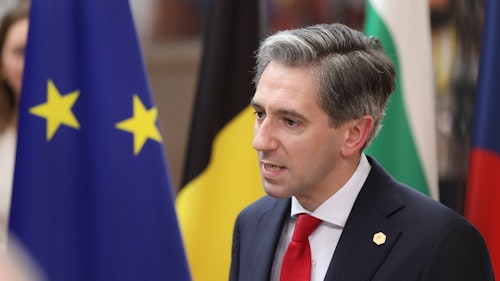
Von der Leyen is a 'good candidate,' says Latvia's prime minister
Latvia is in for VDL Redux.
"Ursula von der Leyen is a good candidate for the Commission," said Prime Minister Evika Siliņa upon arrival at the summit in Brussels. "And Kaja Kallas would be a great candidate for High Representative."
Siliņa, who, like von der Leyen, hails from the centre-right European People's Party (EPP), also supported the name of António Costa to take the reins of the European Council.
"Europe must remain united, that's why I believe a good compromise would be that Costa could be head of the European Council," she said. "For Latvia, it's very important that security and defence will be addressed."
Siliņa urged the bloc to tackle weaponisation of migration, which the Baltics and Poland have suffered in recent years at the hands of Russia and Belarus.
Copyright: Associated Press
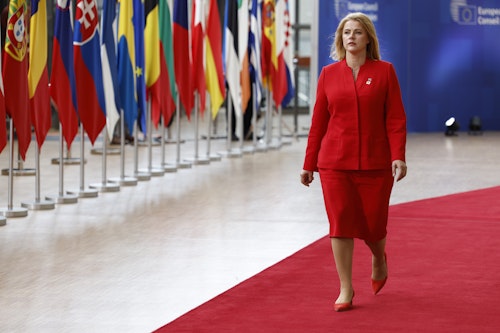
Socialist chief offers von der Leyen support, but no blank cheque...
Ursula von der Leyen visited recently re-elected S&D's President Iratxe García Pérez. She has always said that she supports the Spitzenkandidat process, under which the party that does best in EU elections can name the President of the European Commission. But she also warns likely beneficiary Ursula von der Leyen that there's no blank cheque.
While Council negotiators seem to have already agree in their choice for the job, electing Ursula von der Leyen as president of the Commission for a second mandate, she still needs the support of the European Parliament.
MEPs are expected to gather in a plenary session between 16 and 19 September to allow the new appointed Commission President to make their political pitch and earn the endorsement of, at least, 361 of its 720 members.
Meeting today with the @EU_Commission President.
— Iratxe García Pérez /❤️ (@IratxeGarper) June 26, 2024
We’ll respect Spitzenkandidat process but our vote isn’t a blank check. Our red line is clear: there will be no deal with the extreme right, neither ECR nor ID.
Let’s work together for a green, social, democratic and sustainable… pic.twitter.com/W1vr0gn9Vb
Ukrainian president Zelenskyy celebrates 'historical' outcome
Earlier this week, the EU kickstarted accession talks with Ukraine, following a decision taken by European leaders during a summit in December 2023.
“We waited for this a long period of time,” Ukrainian president Zelenskyy told reporters in Brussels, labelling the outcome as historic.
“Opening negotiations is very important for all or all of us, for all Ukraine. Believe me,” he added, stressing the need to quickly work on the next steps.
Zelenskyy also pointed to other urgent needs, such as air defence equipment and a second Ukraine peace summit to put an end to this war.
The Ukrainian president is expected to sign three security agreements in Brussels, including one with the whole EU.
“For the first time, this agreement will enshrine the commitment of all 27 Member States to provide Ukraine with extensive support, regardless of any internal institutional changes,” he posted on X today.
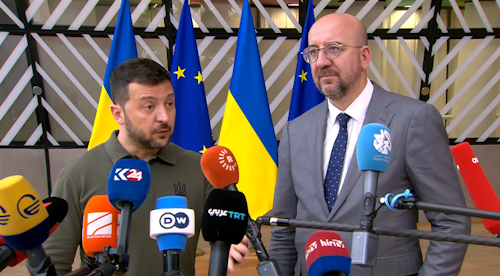
'There is no Europe without Italy and there is no decision without PM Meloni' - Donald Tusk
Polish Prime Minister Donald Tusk said that the pre-cooked decision on a top jobs deal EU leaders are presenting today in the Council was made only to facilitate the process and with no intention of leaving Italy's Georgia Meloni aside.
"One thing must be clear, no one respects Prime Minister Georgia Meloni and Italy more than I do," Tusk said during his address to the media in the Council. He added that sometimes deals are discussed before the meeting to ease the process but the decision is still to be made by all members of the European Council.
Meloni reacted angrily to news earlier this week of the reconfirmed choices for the top jobs, describing the decision-making process as undemocratic.
The Polish Prime Minister also added that Poland's focus for this Council is to discuss Europe's defence strategy and the need for a common security policy.
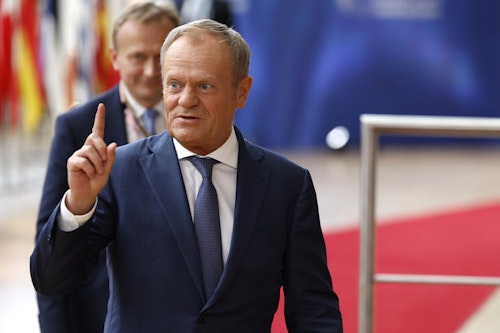
How to fund EU's defence needs: expect controversy
One of the most controversial discussions during the two-day summit will definitely revolve around how to mobilise funding for the bloc’s defence industry.
An EU official promised “animated discussion” on the issue in advance, and the mood can already be felt before the meeting even began.
Some delegations do not want to use common debt as a solution to the issue, two senior diplomats said ahead of the summit.
Despite EU leaders earmarking the urgency of boosting the bloc’s defence needs and initiatives during a March summit, the question of how to pay to get there remains unresolved.
“If financing is needed, let’s have a discussion when the MFF [Multiannual Financial Framework] is put on the table,” an EU diplomat said.
The latest draft of the summit conclusions, dated 26 June and seen by Euronews, invites the Commission and the foreign affairs chief to present “developed options for funding to strengthen the defence technological and industrial base and fill critical capability gaps” - but some member states seem to disagree with this wording at the moment, an EU diplomat told our reporter Gerardo Fortuna.
Renew Europe president celebrates party’s top job, claims central role in majority
Speaking to reporters ahead of Renew Europe's meeting, recently re-appointed liberal group president Valerie Hayer said she was very pleased by the appointment of liberal PM Kaja Kallas as the EU's chief diplomat.
“She is the best choice in these rough times to find good solutions for the challenges ahead,” Hayer told reporters before joining the meeting.
Likewise, she hailed the appointment of Mark Rutte as Nato Secretary General saying it is “a very good news […] as he will be a voice to secure the strength of Nato side by side with the EU defence.”
She said that Rutte’s VVD party is “an important member of our family” confirming Euronews' report on the party's full reintegration into the group, adding that Renew Europe is still working on new MEPs that could join.
But the size of the group shouldn’t be a concern, she added. “We are at the core of the next coalition. There’s no majority without us,” she said, warning von der Leyen that her re-appointment is not a given. “We will ask her [for reassurances] on some of our political priorities such as defence competitiveness, and rule of law.”
Why all eyes are on Giorgia Meloni
Today, as leaders come to Brussels, all eyes are on Giorgia Meloni.
The Italian prime minister is furious over the way top jobs have been negotiated among the three centrist parties, a process she called "surreal", and she seems poised to air her grievances in front of her peers.
"No true democrat who believes in popular sovereignty can in his or her heart consider it acceptable that in Europe there was an attempt to negotiate on top positions even before the people went to the polls," Meloni told the Italian Parliament on Wednesday.
The draft agreement, she added, overrides the logic of consensus because it does not include "those on the opposite political side and those of nations considered too small to be worthy to sit at the table".
But why has the bloc's third-largest economy been left on the sidelines? The reason is rather simple: Meloni hails from the European Conservatives and Reformists (ECR), a hard-right group that challenges European integration, advocates stronger national sovereignty and wants to nix the Green Deal.
Although Meloni has embraced mainstream positions on topics such as Russia's invasion of Ukraine, her political family remains outside the centre and has limited political influence. Meloni and Czechia's Petr Fiala are the only two ECR representatives among the 27 leaders, meaning they can be outgunned if needed.
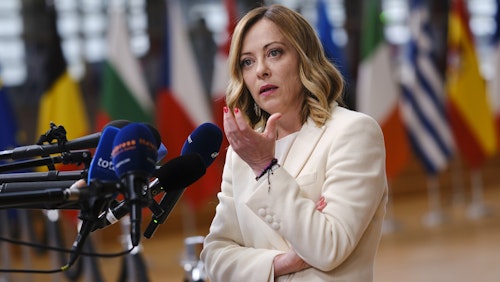
Pre-summit talks: Pellegrini greets Metsola while Kallas bids Stoltenberg farewell
As often happens before an EU summit, leaders are taking time for bilateral meetings.
Slovak President Peter Pellegrini met Roberta Metsola, the president of the European Parliament. Pellegrini is filling in for Prime Minister Robert Fico, who is still recovering from an assassination attempt. Fico's Russian-friendly views prompted the expulsion of his MEPs from the Socialists & Democrats (S&D) group, something that Pellegrini is now reportedly trying to amend.
Earlier on Thursday, Metsola met Swedish Prime Minister Ulf Kristersson.
Meanwhile, far from Brussels' European quarter, Estonia's Kaja Kallas spoke with Jens Stoltenberg, the outgoing Secretary General of NATO. "Thank you, Jens, for the excellent work you have done at the helm of NATO for the past 10 years," Kallas said.
If she eventually becomes the EU's chief diplomat, she's expected to work closely with Stoltenberg's successor, Mark Rutte.
Discussed preparations for the #NATO Summit with @jensstoltenberg.
— Kaja Kallas (@kajakallas) June 27, 2024
Our main tasks: continue strengthening NATO’s deterrence and defence, and our long-term support to Ukraine.
Thank you, Jens, for the excellent work you have done at the helm of NATO for the past 10 years. pic.twitter.com/xDYgtRDo6o
Today's timeline
EU leaders are expected to arrive at the Council from 12:30. Some will be coming from political pre-meetings, including Germany's Olaf Scholz and Denmark's Mette Frederiksen with the Socialists, Emmanuel Macron and Mark Rutte at Renew Europe, and Ursula von der Leyen at the EPP.
The first item on the agenda, planned for 2pm, will be a discussion on Ukraine, for which President Volodymyr Zelenskyy is expected to appear in person to sign an EU-Ukraine security commitment.
Once discussions begin, the agenda will unfold over the rest of the day. Two press conferences are scheduled, including one by the President of the European Parliament, Roberta Metsola, at a time to be confirmed.
While discussions will most likely stretch into the night, EU leaders are expected to address the media once the meeting is over.
The process of top jobs is 'complete', says Orbán
Has Viktor Orbán abandoned his fight? It seems so, according to his spokesperson.
Following a bilateral meeting with President Emmanuel Macron on Wednesday, Hungary's prime minister confirmed the process of EU top jobs is "complete".
Orbán "emphasised that Hungary has always advocated for involving everyone in European decisions, perhaps due to its size and traditions", said a read-out provided by his spokesperson. "It is never good for the European Union to have a governing party and an opposition, a majority and a minority."
Orbán, who is currently not attached to any political family in the European Parliament, has been left out of the discussions between the centrist parties, something that he strongly resents. He has previously indicated that he would vote against Ursula von der Leyen but said he had no objections to either António Costa or Kaja Kallas.
Orbán hasn't proved shy of blocking EU decisions in the past. But the decision on top jobs is taken by a reinforced qualified majority, so there's no veto power.
France Supports Hungary’s EU Presidency Program
— Zoltan Kovacs (@zoltanspox) June 26, 2024
🇫🇷🤝🇭🇺@PM_ViktorOrban has announced that France supports Hungary’s EU Presidency program, which is focused on strengthening the European economy. This announcement came following discussions with French President @EmmanuelMacron in… pic.twitter.com/UyPRiOxKBO
Spain's PM Pedro Sánchez will not attend the EU summit
The meeting of EU leaders will have a surprise guest — Ukrainian leader Volodymyr Zelenskyy — and a last-minute absence, Spanish Prime Minister Pedro Sánchez.
Due to the passing of his father-in-law, Sánchez won't attend the two-day summit in Brussels and has instead delegated his vote to German Chancellor Olaf Scholz, who is from the same socialist political group.
The decision was announced to EU authorities on Wednesday evening.
Weber calls for Meloni’s inclusion in EU top jobs decisions
The head of the powerful centre-right European People’s Party (EPP) has called for Italy’s inclusion in EU decision-making.
The news comes as EU leaders converge on Brussels for a top jobs summit which Italian Prime Minister Giorgia Meloni has slammed as "undemocratic".
"Italy is the third largest country in Europe, a member of the G7, one of the largest European economies. That is why it is necessary to find a way to include the Italian position in the European decision-making process,” Manfred Weber told Italian daily Corriere della Sera in an interview today (27 June).
Weber calls for Meloni’s inclusion in EU top jobs decisions
The leader of the powerful centre-right European People’s Party called to integrate Rome into decision-making after complaints from Italy’s Georgia Meloni. #Eu…
EU leaders expected to agree on next top jobs
Last week, the agreement on the new high-level EU jobs looked like a done deal - but it proved trickier than expected, and while the names seemed to be agreed by a majority of countries, not every leader felt part of the conversation.
Following the failed attempt, the six negotiators of the main centrist parties –Poland's Donald Tusk, Greece's Kyriakos Mitsotakis, Germany's Olaf Scholz, Spain's Pedro Sánchez, France's Emmanuel Macron and the Netherlands' Mark Rutte – held a phone call earlier this week and reconfirmed the selection.
The names on the table are well-known by now: Ursula von der Leyen as president of the European Commission, António Costa as president of the European Council and Kaja Kallas as High Representative for Foreign Affairs and Security Policy.
Read Jorge's Liboreiro preview of the summit here ⬇️
Negotiators have a deal on EU top jobs. But will the 27 leaders agree?
The two-day summit will focus on the EU top jobs, the Strategic Agenda for the next five years, military support for Ukraine and the Israel-Hamas war. #EuropeN…
Welcome to another Euronews Live Blog! I'm Paula Soler and I'll be your guide on this sunny Thursday ☀️. EU leaders are gathering in Brussels for a two-day summit to decide on who should lead key EU institutions, and the political vision for the next five-year mandate. They'll also discuss Ukraine, defence and security, competitiveness, migration and the Middle East.
Stay tuned for insights, analysis and reaction from the first formal summit since the June European elections.











